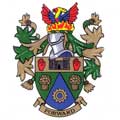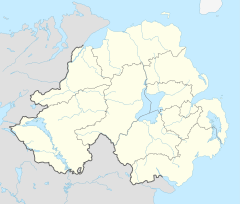
Back Кукстаун Bulgarian Cookstown Catalan Cookstown (kapital sa distrito sa Hiniusang Gingharian) CEB Cookstown German Cookstown Spanish Cookstown Basque کوکزتاون Persian Cookstown (Irlande du Nord) French An Chorr Chríochach Irish An Chorr Chríochach Scots/Gaelic
| Cookstown | |
|---|---|
 Cookstown coat of arms | |
Location within Northern Ireland | |
| Population | 12,546 (2021 Census) |
| Irish grid reference | H8178 |
| • Belfast | 47 miles |
| District | |
| County | |
| Country | Northern Ireland |
| Sovereign state | United Kingdom |
| Post town | COOKSTOWN |
| Postcode district | BT80 |
| Dialling code | 028 |
| Police | Northern Ireland |
| Fire | Northern Ireland |
| Ambulance | Northern Ireland |
| UK Parliament | |
| NI Assembly | |
| Website | http://www.midulstercouncil.org |
Cookstown (Irish: An Chorr Chríochach,[3] [ənˠ ˌxoːɾˠ ˈçɾʲiːxəx]) is a town in County Tyrone, Northern Ireland. It is the fourth-largest town in the county and had a population of 12,546 in the 2021 census.[4] It, along with Magherafelt and Dungannon, is one of the main towns in the Mid-Ulster council area. It was founded around 1620 when the townlands in the area were leased by an English ecclesiastical lawyer, Dr. Alan Cooke, from the Archbishop of Armagh, who had been granted the lands after the Flight of the Earls during the Plantation of Ulster. It was one of the main centres of the linen industry west of the River Bann, and until 1956 the flax-related processes of spinning, weaving, bleaching and beetling were carried out in the town.
- ^ "Cookstown District Council". Archived from the original on 4 September 2012. Retrieved 15 February 2008.
- ^ "Ulster-Scots guide to Beaghmore stone circles – Department of the Environment" (PDF). Archived (PDF) from the original on 1 October 2015. Retrieved 17 July 2012.
- ^ "An Chorr Chríochach/Cookstown". Placenames Database of Ireland (logainm.ie). Department of Tourism, Culture, Arts, Gaeltacht, Sport and Media (Ireland) and Dublin City University. Retrieved 12 November 2020.
- ^ Cite error: The named reference
2021 popwas invoked but never defined (see the help page).
